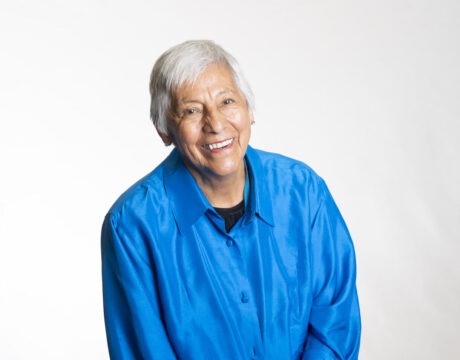Início da Creative, O crescimento e a consolidação como uma empresa de desenvolvimento internacional de impacto social é uma inspiração para todas as mulheres que procuram fazer a diferença em seus setores, e os homens que querem apoiá -los. Em 1977 (46 ano atrás!) em um Washington, DC, porão, Quatro mulheres com diversas origens culturais e uma única paixão pela excelência educacional e pela oportunidade fundou a empresa que se tornaria Creative Associates International (Saiba mais sobre o nosso história aqui).
Originalmente da Bolívia, Charito Kruvant é uma daquelas quatro mulheres fundadoras. Charito continua a ser ativamente envolvido como membro do conselho, Compartilhando sua paixão contagiosa pelo trabalho de desenvolvimento e sua crença em parcerias fortes e mutuamente benéficas com o que ela chama de maneira criativa. O grande coração e a natureza resoluta de Charito atraíram milhares de parceiros orientados para missões da mesma missão para trabalhar ao nosso lado e garantir um impacto duradouro.

É uma tradição familiar que permaneceu após uma geração, Isso é o que aconteceu no Creative,”Afirma Charito com um sorriso, em seu estilo sempre gentil e nutritivo, mas determinado.
Além do anedótico, Evidências sugerem que esse estilo de liderança é exatamente o que as mulheres líderes trazem para a mesa. Um estudo sobre comportamentos de liderança por McKinsey & Empresa sugere que mulheres, com mais frequência do que homens, Exibir estilos e características de liderança que são altamente aplicáveis aos desafios globais, incluindo inspiração, tomada de decisão participativa, Configuração de expectativa e recompensas, desenvolvimento de pessoas, e modelagem de papéis.
Ainda, As mulheres permanecem sub-representadas em papéis de liderança em muitos setores. Um caso particularmente interessante e irônico é o das mulheres na liderança educacional. Globalmente, As mulheres compreendem a maior parte da força de trabalho educacional - exceto no topo. Enquanto quase 7 fora de 10 primário e 5 fora de 10 Os professores do ensino médio são mulheres, O número de mulheres em posições de liderança escolar fica muito atrás (UNICEF, 2022). Na América Latina, Embora os diretores sejam desenhados quase exclusivamente do estoque de professores, Há pelo menos uma lacuna de 20 pontos na porcentagem de diretoras em comparação com as professores em oito dos 15 países participando de terce (Banco Mundial, Adelman & Lemos, 2021).
Enquanto fechar lacunas de liderança de gênero é intrinsecamente importante, Há motivos para acreditar que mais mulheres líderes no setor também são boas para a educação e para crianças. Um novo corpo de evidência está surgindo sobre o impacto das mulheres na liderança da educação, sugerindo uma associação positiva entre líderes escolares de mulheres, desempenho do aluno, e resultados educacionais das crianças. Por exemplo, Na pesquisa mencionada acima, UNICEF descobriu que as escolas lideradas por mulheres relatam níveis mais altos de liderança instrucional, medido através de ações como apoiar os professores para colaborar, motivando os professores a melhorar suas habilidades, e fazendo com que os professores se sintam responsáveis pelo aprendizado dos alunos.
Se as mulheres estão igualmente ou mais bem equipadas para liderar instituições educacionais é especialmente relevante, considerando sua sub-representação significativa. Os milhões de professores que alimentam o sistema educacional em todo o mundo devem ser capazes de buscar um caminho para a liderança se tiverem o talento, Dirija e visão para fazer grandes coisas para crianças além da sala de aula.
A derrubada desse padrão exige políticas e práticas específicas que abordem e desafiam o contextual, cultural, Societal, e barreiras estruturais que impedem as mulheres de avançar para as funções de liderança da escola. Enquanto a reforma de políticas e as barreiras estruturais são mais difíceis de quebrar, Atores como Creative podem desempenhar um papel no nivelamento do campo de jogo, expandindo o acesso a treinamento relevante, Informação, redes, e inspirando modelos para mulheres líderes na educação.
Charito sobre nutrir executivo e outros conselhos
Além de fundar e liderar uma organização de desenvolvimento internacional bem -sucedida, Charito tem sido casado por 56 anos para o marido Bill, e juntos eles têm dois filhos e três netos que permanecem próximos ao seu lado. Aqui estão algumas palavras de sabedoria de uma mulher que provou que realmente mulheres pode tem tudo:
- Missão, objetivo e autoconsciência: Saiba que você não pode fazer tudo sozinho. O papel maior que você assume, quanto mais você precisa confiar e confiar nos outros. É como segurar as mãos para segurar água. Há muito que você pode carregar sozinho. Se você assumir mais do que pode carregar, apenas cai. Confie em si mesmo para escolher a equipe certa e ser claro sobre o que você deseja realizar.
- Estar aberto para liderar do coração: Confie em sua experiência e seu amor pela missão. A parte nutritiva da liderança sai mais facilmente para as mulheres e devemos abraçá -la. Liderança baseada no medo e a busca de objetivos individuais freqüentemente levam ao sucesso compartimentado no trabalho, em detrimento da família, amigos, e, finalmente, o indivíduo.
- Rejeição de canal como um desafio energizante: Todas as mulheres, particularmente mulheres de cor, em qualquer ambiente que não seja o nosso, deve provar a nós mesmos repetidamente. Para mim, nunca parecia rejeição, Sempre foi um desafio. Sempre que desafiado, Eu sabia disso da próxima vez que poderia fazer isso melhor. Washington é um local de poder, E eu tive muitas oportunidades para me provar em todos os cenários - e a prática leva à perfeição.
- Vieses de gênero: Muitas mulheres nas Américas tornaram -se tão educadas quanto homens, com maior participação na universidade e evidências de que eles são mais competentes no trabalho em alguns campos. A lacuna de gênero hoje é realmente um viés de gênero, e esses vieses são mais agudos em lac do que em outros lugares. As mulheres precisam fazer seu papel para quebrar esses preconceitos também.
- Defender outras mulheres: Tendemos a ser mais difíceis um para o outro e temos que ser mais fáceis para nós mesmos e para outras mulheres para ajudar e se elevar. As mulheres também precisam parar de se desculpar e aproveitar oportunidades quando as vê. Finalmente, Esteja atento que os hábitos que nos fizeram bem -sucedidos em níveis mais baixos precisam ser repetidos no nível executivo. Eu chamo isso de nutrimento executivo.
- Equilibrando a vida profissional e familiar: Casamento é amor e compromisso, E no meu mundo, O compromisso foi para sempre. Na permutação de como você planeja sua vida profissional, você deve permanecer comprometido com sua vida familiar. Por exemplo, Eu percebi cedo, depois de três semanas de casa, a estrutura familiar e a autoridade moral começaram a mudar, Então eu nunca fiquei longe por mais do que isso. As empresas devem apoiar uma e outra vez com a família. Lembre -se de sempre ir para onde você e sua vida familiar são celebrados, não apenas tolerado.
Charito Kruvant, Co-fundador e presidente executivo do conselho. Entrevistado e modelo de mulher inspiradora.
Claudia Salazar Suárez, Gerente técnico sênior, Especialista em lac, Divisão de ED. Escritor e facilitador.
(EUn seu estilo de liderança executiva, Charito insistiu que eu não permanecesse na sombra. Só posso agradecer a ela por ser um modelo tão inspirador para todos e por criar uma missão em que muitos de nós possam acreditar.)
